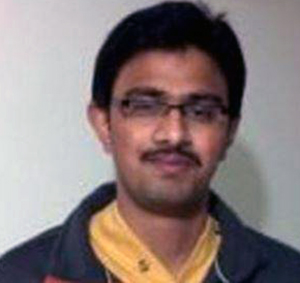Hyderabad, Feb 24: A pall of gloom descended on the residence of engineer Srinivas Kuchibhotla at Bachupally here today when his parents and family learnt about his death after an American navy veteran yelling "terrorist" and "get out of my country" opened fire on him in the US.
Srinivas Kuchibhotla (32), working at GPS-maker Garmin headquarters in Olathe, died of bullet injuries in hospital while his Indian colleague Alok Madasani was critically injured when the 51-year-old shooter, Adam Purinton, started hurling racial slurs following an altercation on Wednesday night in the US.
Some cousins of Srinivas, who met and consoled his parents and other family members told reporters that after completing his B Tech from the city, Srinivas left for the US in 2005 for M Tech.
"Four years back he got married. He was highly appreciated by his managers at his workplace. In 2014, he shifted to Garmin company.
"We have been told the shooting is due to hate crime. Srinivas was a very good person... we miss him," an inconsolable Krishnamohan (cousin) said.
"This is a hatred kind of murder (hate crime attack). We normally won't answer when such people shout. I have myself worked in the US and I know it. I think my cousin also might have not answered back to him. Probably, after (US President Donald) Trump we are seeing this... we feel racist attacks have increased. Previously this was not the scene. There were incidents once in a while, now it has become very frequent. It happened in our house this time. It's very sad," Venu Madhav, another cousin, said.
However, they thanked External Affairs Minister Sushma Swaraj for immediate response in the matter by sending two officials for completing the formalities.
"Srinivas's brother stays in Dallas. I co-ordinated with my friends and asked them to help them out. Till now the body has not been given to us and we are expecting the body to be handed over by tonight," he said.
"Sushma Swaraj spoke to our family members and has extended support. Recently one youth (M Vamshi Reddy) from Warangal, was also shot dead in US (California). Such incidents should not be repeated," they said.
Meanwhile, Alok's father Jaganmohan Reddy, who stays in Chaitanyapuri area here said his elder son who also stays in the US called him this morning and informed him about the shooting incident and that his younger son (Alok), who was injured in the incident has been admitted to a hospital.
"I have spoken to Alok... he is doing fine... I am planning to go to the US and meet him," Jaganmohan told PTI.
Besides Srinivas and Alok, a third person, an American identified as Ian Grillot (24), who tried to intervene also received injuries in the firing in Austins Bar and Grill in Olath.
"As per the information I have got, Srinivas, Alok and the American man (Ian Grillot) were in the restaurant. The moment the attacker saw Srinivas and Alok he started shouting on them and asked them to leave the country," Jaganmohan, whose son Alok has been working in the US since 2006, said.
"Neither Srinivas nor Alok argued with him. But he continued shouting and within minutes came out with a gun and fired a round at Srinivas while my son was near the food counter.
"After hearing the bullet shots he ran out but one bullet after hitting the wall hit my son in his thighs. My son escaped... saved his life. The American was also shot by the attacker... unfortunately Srinivas died in the shooting," Jaganmohan added.





Comments
Add new comment